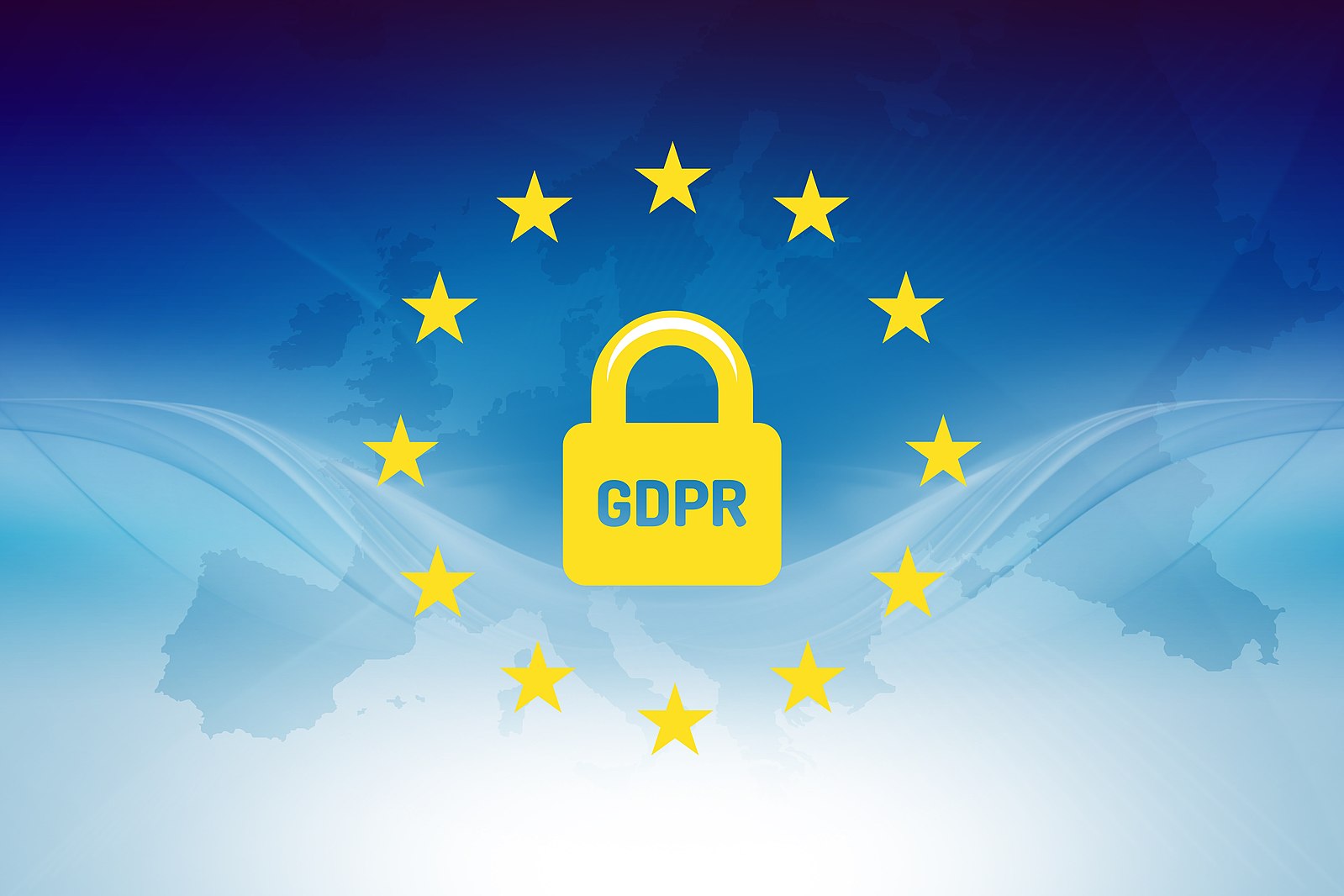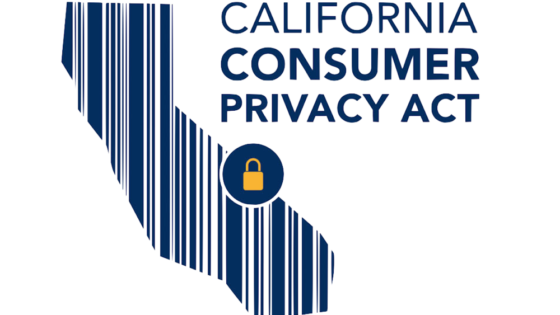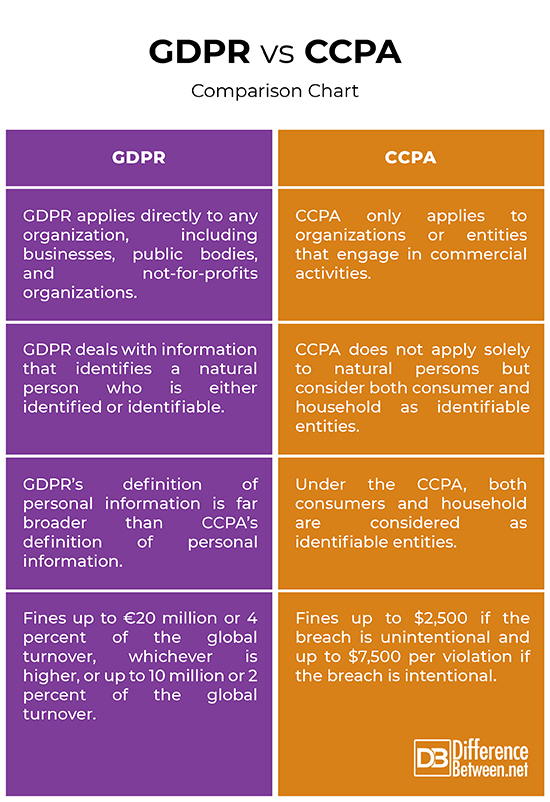Difference Between GDPR and CCPA
Both GDPR and CCPA are undoubtedly the most significant developments in personal data protection and privacy regulation in recent years. Both take into account current technological ecosystem in the digital age and threats to privacy. Although, the CCPA is considered as a GDPR-type data privacy legislation focused on consumer data protection, it is fundamentally different than GDPR in terms of scope, nature, consumer rights, personal information, etc. We take a look at some noteworthy differences between the two.

What is GDPR?
The General Data Protection Regulation, or GDPR, is a regulation drafted and passed by the European Union (EU) on the protection of personal data and privacy of EU citizens. It is a legal framework that imposes restrictions on Europe’s already strict laws about what companies can do and cannot do with personal data. The GDPR gives you more control over how your data is collected and used, and companies to justify everything they do with your personal data. Although, the legislation aims to unify data protection legislation across Europe but it has a significant impact on businesses outside the EU including the United States. The GDPR is the successor of the EU Data Protection Directive 1995 which came into effect on May 25, 2018. The GDPR was introduced strictly to make Europe fit for the digital age with strict laws in regards to data protection that ensures people are in control of how their personal data should be used.

What is CCPA?
The California Consumer Privacy Act, or CCPA, is a comprehensive privacy regulation in regards to data privacy and personal data protection for the residents of California. Like GDPR, CCPA is a set of guidelines that regulate how businesses worldwide can and cannot do with the personal data of Californian residents. The CCPA provides provisions specific to California residents and the companies regarding the compulsory law to protect personal information statewide. As a directive, companies must maintain accurate records of consumers’ personal information from Jan 1, 2019 onward. The legislation applies to businesses that do businesses in California on how they should handle the personal data of the residents. The law grants some fundamental rights to the residents which allow them to know what personal data is collected about them and how the data is being used.
Difference between GDPR and CCPA
Scope of Application
– The General Data Protection Regulation, or GDPR is the new European act on personal data protection of EU citizens, which gives the citizens more control over how their data is collected and used. The GDPR applies directly to any organization, including businesses, public bodies, and not-for-profits that processes personal data as the controller or processor in an EU member state. Like GDPR, the CCPA (California Consumer Privacy Act) protects the fundamental rights of the California citizens in regards to personal data protection and privacy. The CCPA only applies to organizations or entities that engage in commercial activities meaning they must operate for a profit.
Legal Framework
– The core legal framework of the GDPR is quite different from that of the CCPA. A key fundamental principle of the GDPR is that the businesses addressing their offer to EU residents have to directly consult the GDPR and not the national legislation of particular EU member states. C online or offline. The core principle of the GDPR is to create a new, uniform personal data protection system at EU level. The CCPA, on the other hand, does not have such legal framework. The businesses generally do not need consent to collect personal information of the California residents under CCPA.
Personal Information
– While both GDPR and CCPA impose strict laws against breach of personal information and privacy, their definition of personal information is very different. The GDPR’s definition of personal information is far broader than CCPA’s definition of personal information. The GDPR defines personal information as any information relating to a natural person, who is either identified or identifiable, directly or indirectly from the information in question. What identifies a person could be as simple as a name, an ID or anything like a location, or more identifiers. The CCPA’s definition of personal information encompasses a wide range of technological data markers. Under the CCPA, both consumers and household are considered as identifiable entities.
Financial Penalties
– Non compliance of both GDPR and CCPA can lead to some serious repercussions in the form of administrative fines or financial penalties. Violators of GDPR may be fined up to €20 million or 4 percent of the global turnover for the preceding financial year, whichever is higher. For lesser breaches, the GDPR imposes fines up to a maximum of €10 million or 2 percent of the global turnover worldwide for the last financial year, whichever is higher. Violators of CCPA may be fined a penalty of $2,500 under a civil action by the Attorney General. If the breach is considered to be intentional, then the fine may exceed up to $7,500 per violation.
GDPR vs. CCPA: Comparison Chart

Summary
Both GDPR and CCPA are the two most significant developments in privacy regulation n recent years and both focus on current technological system and threats to privacy. The GDPR is considerably more complex and extensive, and mandates specific operational and management requirements. The GDRP’s definition of personal information is more personal, while the CCPA is about outcomes, enumerating rights and protecting those rights. The GDPR applies to all kinds of organizations, including for-profit and not-for-profit, whereas the CCPA only applies to for-profit organizations.
- Difference Between Caucus and Primary - June 18, 2024
- Difference Between PPO and POS - May 30, 2024
- Difference Between RFID and NFC - May 28, 2024
Search DifferenceBetween.net :
Leave a Response
References :
[0]Dibble, Suzanne. GDPR For Dummies. New Jersey, United States: John Wiley & Sons, 2019. Print
[1]Gawronski, Maciej. Guide to the GDPR. Alphen aan den Rijn, Netherlands: Kluwer Law International, 2019. Print
[2]Richardson, Megan. Advanced Introduction to Privacy Law. Cheltenham, United Kingdom: Edward Elgar Publishing, 2020. Print
[3]Stallings, William. nformation Privacy Engineering and Privacy by Design: Understanding Privacy Threats, Technology, and Regulations Based on Standards and Best Practices. Massachusetts, United States: Addison-Wesley, 2019. Print
[4]Haber, Morey J. Privileged Attack Vectors: Building Effective Cyber-Defense Strategies to Protect Organizations. New York, United States: Apress, 2020. Print
[5]Image credit: https://www.workplaceprivacyreport.com/wp-content/uploads/sites/162/2018/09/ca-consumer-privacy-act-the-huge-data-battle-will-include-tech-giants-70864-560x315.png
[6]Image credit: https://commons.wikimedia.org/wiki/File:Gdpr_Europe.jpg
